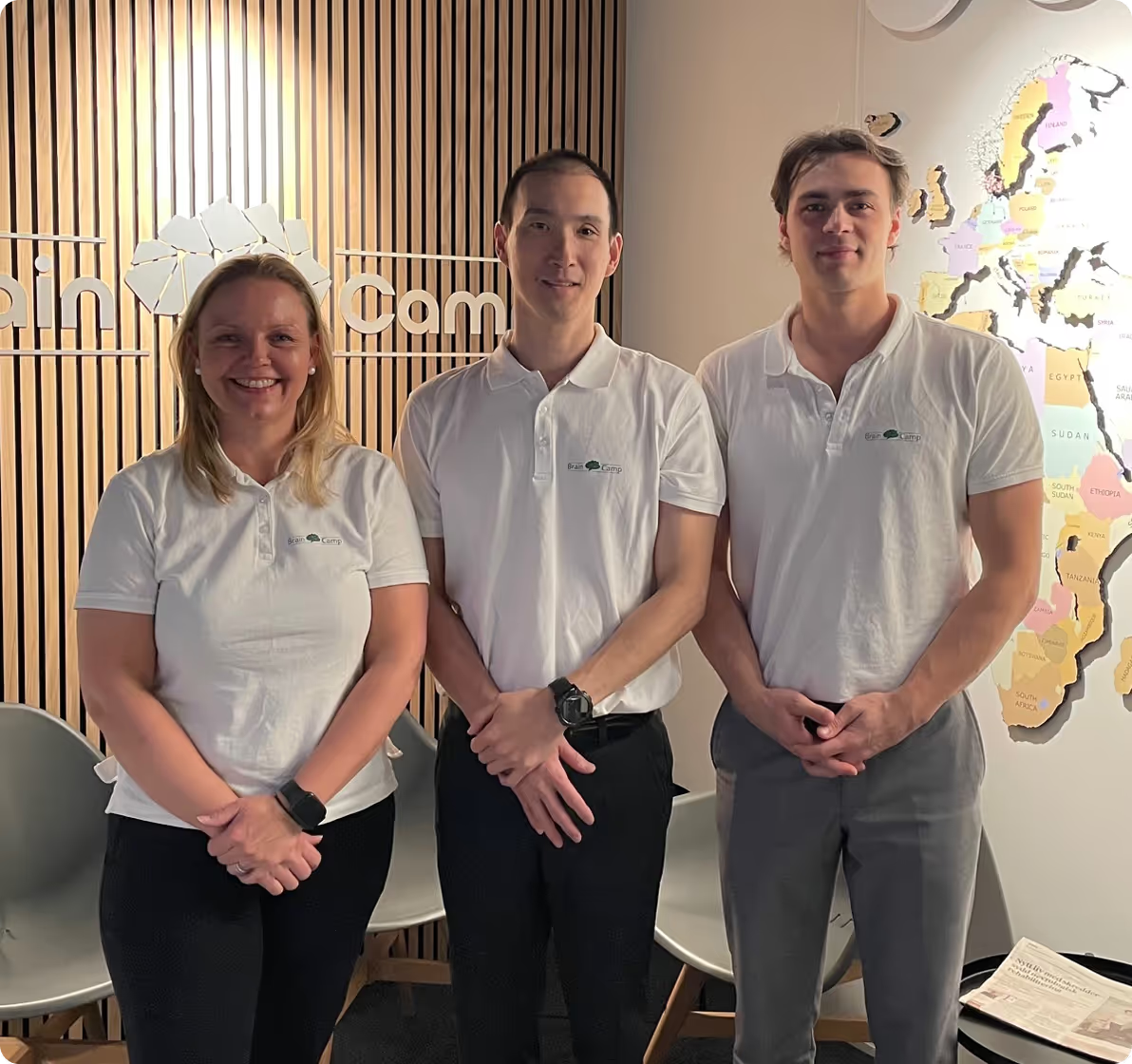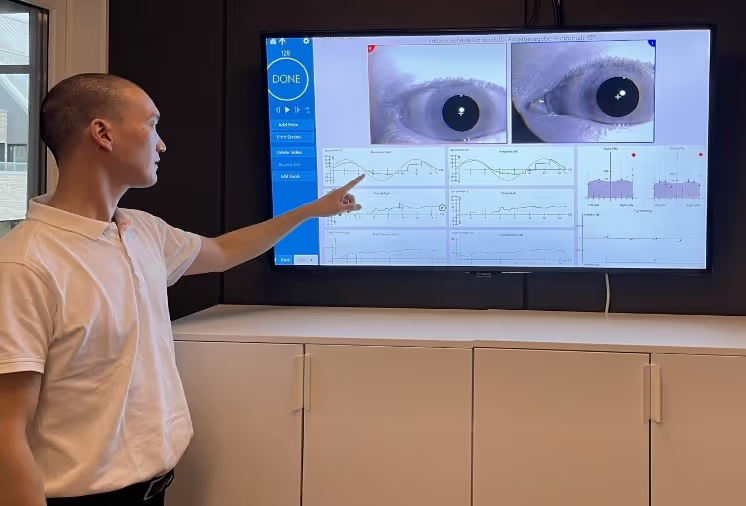Trygghet og kompetanse for din rehabilitering
Brain Camp hjelper barn og voksne som har utfordringer med forskjellige typer svimmelhet, nevrologisk sykdom eller senskader etter traumatisk hodeskade og nakkesleng. Hos oss møter du et erfarent team som har over 18 års erfaring med å hjelpe mennesker fra hele Europa med komplekse plager som følge av svimmelhets syndrom, nevrologisk sykdom eller skader.


Våre verdier
Kompetanse
Vi har 15+ år erfaring innen nevrologisk rehabilitering for barn og vokse. Vi holder oss alltid oppdatert på den nyeste forskningen.
Oppfølging
Hver pasient får et opplegg tilpasset sine behov. Les mer om vårt rehabiliteringsopphold her.
Trygghet
Vi følger deg godt opp i perioden med øvelser hjemme før du kommer tilbake for ny re-test for å vurdere om du er klar for neste fase.
Our therapists
Vår erfaring er at det er de små detaljene som kan være nøkkelen som skiller mellom mislykket effekt eller effektiv rehabilitering. Vi legger derfor stor vekt på databaserte tester som gir oss detaljert objektiv informasjon om hvordan hjernen og nervesystemet ditt fungerer. Med over 18 års erfaring og kontinuerlig oppdatering på den nyeste nevrovitenskapelige forskningen og undersøkelsesutstyr, hjelper vi barn og voksne i alle aldre med akutte og kroniske plager. For våre tilreisende pasienter har vi et eget skreddersydd rehabiliteringsopphold. Les mer om 5-dagers rehabiliteringsopphold.
Vi samarbeid med de fleste norske forsikringsselskapene og du kan bruke din behandlingsforsikring ved behandling av muskel og ledd plager hos oss. Ved krystallsyke (BPPV) må du høre med forsikringsselskapet ditt om de dekker behandling i TRV-stol.

Kim Tore Johansen
Kiropraktor og daglig leder
Kiropraktor med tilleggsutdannelse innen klinisk nevrovitenskap og nevrologisk rehabilitering. Kim har lang erfaring som faglig leder og faglig utvikler for flere klinikker. Før han etablerte Brain Camp, var han faglig leder og faglig utvikler for en av Europas største konsern for fysikalsk behandling. Gjennom de siste 18 årene har han spesialisert seg i undersøkelse og tilpassing av skreddersydd nevrologisk rehabilitering av komplekse svimmelhets syndrom, nevrologisk sykdom, traumatisk hodeskade og nakkeslengskade. De gode resultatene til Kim og hans team har tiltrukket seg barn ogvoksne fra hele Europa som trenger hjelp til å forbedre funksjonsevne og livskvalitet.
.jpg)
Didrik Fossan
Kiropraktor
Kiropraktor under videreutdannelse innen klinisk nevrovitenskap og nevrologisk rehabilitering. Didrik er teamansvarlig for pasienter med svimmelhet forårsaket av krystallsyke (BPPV) og betennelse på balansenerven (Vestibulares nevritt). Ved hjelp av grundig undersøkelse, avansert databasert utstyr, og eneste klinikk i Agder som har TRV-stol. Hjelper Didrik mennesker som er plaget med akutt og kronisk krystallsyke i løpet av få behandlinger. Didrik jobber også med idrettslag og har bred erfaring med akutte og kroniske muskel og ledd plager.
.jpg)
Silje Stenhaug
klinikkassistent
Silje har vært klinikkassistent og en essensiell del av Brain Camp sitt team i over 5 år. Som klinikkassistent, jobber hun tett sammen med Kim med å ta tester, behandle, og følger opp pasienter i perioden de jobber med hjemmeøvelser selv. Hennes imøtekommende varme personlighet, gir deg som pasient en varme og trygg opplevelse hos oss.
Hva våre veldige fornøyde kunder fra legelisten sier om Brain Camp
Excellent treatment effect
All in all, I would highly recommend Kim and Brain Camp Kristiansand. Their expertise and confidence have led to positive results.
Seriøs, hyggelig, kompetent, oppdatert, engasjert og trygg
14 åringen i familien gikk med en ubehandlet hjernerystelse. Vi følte at fastlege, nevrologer og andre ikke tok det vi mente var symptomer på et større problem på alvor. Høsten 2022 lette vi desperat etter alternativer og fant Kim Tore og Brain Camp. Nå, litt over 2 år senere er sønnen 18 år og jobber fulltid i læra.
Dyktig og profesjonell
Har slitt med krystallsyke i mange år. Det har vært vanskelig å vite akkurat hvor krystallene var løsnet. Fordi Kim Tore Johansen bruker digitale hjelpemidler ble sted konstatert fort, og behandlingen startet umiddelbart. Behandlingen føltes trygg og den har hjulpet meg videre. Jeg vet også at hvis jeg trenger hjelp fort, er han lett å få kontakt med.
Endelig fikk vi hjelp
Kom med vår datter som hadde slitt med kronisk hodeverk /utmattelse etter fall av hest , der hun fikk hjernrystelse. hos Kim ble vi endelig forstått, og tatt på alvor , og gjennom et meget godt opplegg, tilpasset henne, er hun idag en helt annen jente, hun har fått tilbake energien, og fått forbyggende medisner. Så vi er veldig takknemlig for hjelpen, uten den må gudene vite hvordan det hadde vært nå.
Våre behandlinger
Ved Parkinsons sykdom er vestibulær dysfunksjon en ofte undervurdert medvirker som både forårsaker og forverrer motoriske og ikke-motoriske plager.
Vi behandler svimmelhet og balanseproblemer Vi tilbyr deg grundig utredning, moderne teknologi og individuelt tilpasset behandling, for varig bedring.
Hjernerystelse og nakkeslengskade forårsaker komplekse funksjonsforstyrrelsene i hjernen din som gjøre det utfordrende å bearbeide og samkjøre flere sanseinntrykk samtidig.
